Soy sauce is a beloved condiment used in various cuisines worldwide, particularly in Asian dishes. Known for its rich umami flavor, it enhances everything from stir-fries to sushi. However, as plant-based diets become more popular, many are asking, “Is soy sauce vegan?” This article explores the ingredients and variations of soy sauce to determine whether it fits within a vegan lifestyle, helping you make informed choices.
What is Soy Sauce?
Soy sauce makers create a savory condiment from a simple blend of soybeans, wheat, water, and salt. These ingredients undergo a fermentation process that typically involves the use of specific molds and bacteria. The soybeans and wheat are first cooked and then combined with salt and water. This mixture is left to ferment for several months, allowing the flavors to develop into the rich, umami taste that soy sauce is known for. The result is a liquid that enhances the flavor of various dishes.
Is Soy Sauce Vegan?
Soy sauce is vegan, as it is primarily made from plant-based ingredients like soybeans, wheat, water, and salt. However, some soy sauces might include non-vegan elements, particularly during the fermentation process. For example, lactic acid bacteria, used in some fermentations, can sometimes be derived from animal sources, though this is rare. Additionally, some vegans may avoid brands like Kikkoman due to past ethical concerns related to animal testing. Always check labels to ensure the soy sauce you choose aligns with your vegan principles.
What is soy sauce made of
Soy sauce makers use the following ingredients to create this traditional Asian condiment:
- Soybeans: The key ingredient providing the base for the sauce.
- Wheat: Commonly used, especially in Japanese-style soy sauces, to add sweetness and depth to the flavor.
- Water: Used to mix and facilitate fermentation.
- Salt: Essential for preservation and enhancing the umami flavor.
The production process starts by fermenting these ingredients with mold cultures, such as Aspergillus oryzae. Next, manufacturers press the mixture to extract the liquid soy sauce. Furthermore, the fermentation process can vary: some producers brew soy sauce naturally, while others use hydrolyzed vegetable protein for faster production.
Is Soy Sauce Vegetarian?
Yes, people generally consider soy sauce vegetarian because it lacks animal flesh or by-products. The primary ingredients—soybeans, wheat, water, and salt—are all plant-based. However, the key difference between vegetarian and vegan soy sauce lies in the potential use of non-vegan additives, such as lactic acid bacteria or certain preservatives. Although these additives might not contain animal flesh, some manufacturers derive them from animal sources. As a result, certain soy sauces may be vegan but not vegetarian.
Vegan-Friendly Brands
Kikkoman Soy Sauce: Traditionally brewed, widely available.
San-J Tamari: Gluten-free, made primarily from soybeans.
Bragg Liquid Aminos: Soy sauce alternative, non-GMO.
Yamasa Soy Sauce: Traditional, rich flavor.
Ohsawa Nama Shoyu: Unpasteurized, organic.
365 by Whole Foods Market: Organic, budget-friendly.
Eden Foods Shoyu Soy Sauce: Naturally brewed, organic ingredients.
Trader Joe’s Soy Sauce: Simple, traditional ingredients.
Soy sauce is typically vegan, as manufacturers make it from soybeans, wheat, water, and salt. However, some variations may include non-vegan additives. Therefore, by selecting high-quality or certified vegan brands, you can enjoy this flavorful condiment with confidence. Furthermore, with numerous vegan-friendly options available, soy sauce continues to be a versatile and essential addition to plant-based diets.




